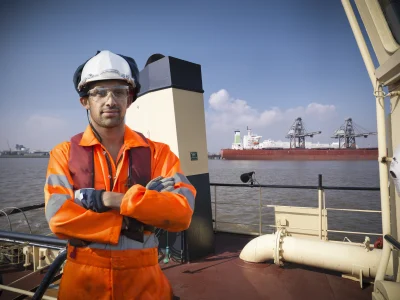
The definitive guide to port entry
Leaving and arriving at maritime ports are complex procedures for ships and require detailed preparation. This can be time-consuming, and getting it wrong has its consequences. Arriving at port without the correct authorisation or certification can cause delays and potentially result in fines.
Since 1971 Guide to Port Entry directories have been essential for mariners worldwide. Nowadays all crew members can access this information through the onboard Platform as part of the voyage planner software, which is updated daily with the latest information about each port and easily interrogated to make sure everyone on the vessel can use it.
It is also available as an online digital subscription onshore, CD resource or in its traditional printed format.
It ensures the ship master knows what the entering port procedures are before arrival, helps them berth and exit safely, and be compliant throughout their visit. This saves time, money and avoids fines for breaching ports’ rules and regulations. And when conditions and regulations change: those using the software get the most up-to-date information.
The team behind the port data
You can be confident that the information being used is compiled by an experienced team, staffed by ex-mariners who update the data every working day.
OneOcean Port data advantages
Comprehensive port information
- Search for up to 18,000 port terminals, sub ports and aliases (alternative names) – the best ports database in the maritime industry.
- Nearly 700 photos of ports available to assist mariners with navigation, planning, and safety.
- Ship managers can plan onshore time or respond to requests when they know who to contact – the data includes information on hospitals, Seafarers Clubs, laundry, available services, and a whole lot more.
Compliant port entry and exit
- Having the latest information to hand means crew are less likely to breach port regulations and so avoid delays, fines or detentions.
- Access and download all port documents required on arrival and ensure all logbooks and certificates are ready for inspection.
Efficient, safe and cost-effective
- Speeds up the process of planning port entries and exits and makes the information widely available on board and onshore.
- Minimises unnecessary manoeuvring by identifying in advance the safest way to enter a port.
- This saves time and fuel, helps reduce the risk of accidents, and keeps vessels and onboard crew safe – avoiding damage.
How it works: your destination is the Port of Mumbai
Save time and money
Your ship is scheduled to sail to the Port of Mumbai and requires several operational arrangements, including taking on fuel and fresh water, and coordinating the delivery of ship supplies.
Traditionally, the vessel’s agent might arrange services or obtain contact details for relevant providers. While the agent's involvement is often necessary, this can increase the time required and introduce additional costs, as agents may include commission fees.
With accurate Ports data, your crew can see the details and directly engage with providers, improving efficiency and transparency. Even if the agent is required, the operator remains aware of cost breakdowns and can make informed decisions.

Latest insights

Strategic by design: unlocking the full value of fleet-wide passage planning
Other solutions you might be interested in

Navigation
Preparing mariners with the insights needed to stay compliant, while safely and efficiently navigating every stage of the journey.
Compliance
Ensure your fleet and vessels always meet regulatory, environmental and reporting requirements with comprehensive maritime compliance software, compiled by the most experienced team in the business.
Operations
Providing the granular detail shoreside teams need to monitor fleet activity in a single view.